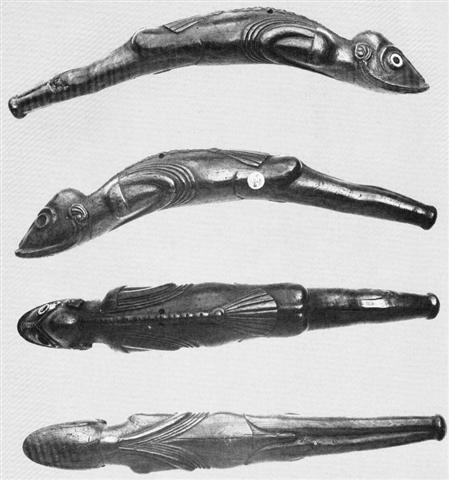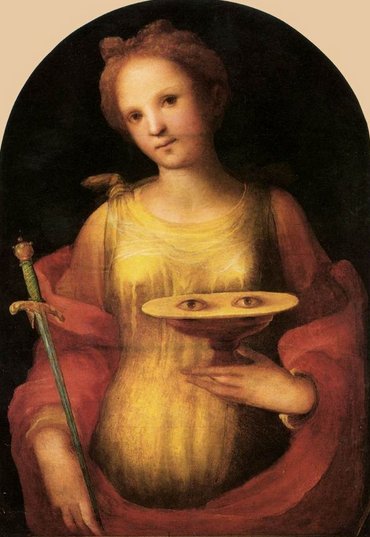|
584
42 Evidently side b on the C tablet could have had Arcturus (*215) located 6 days after Polaris (*26) at the end of side a. *26 (Polaris) + *6 = *32 = *215 (Arcturus) - *183. Turning the C tablet around might have implicated a change from heliacal to nakshatra view (or on Easter Island from nakshatra to heliacal view). Whereas the A tablet seems to have Arcturus directly at the beginning of its side b - with side a (670) carrying 6 right ascension days more than side b (664).
Ab1-6--7 should then correspond to Cb1-12--13. Let's count! (Hia!)
671 (Ab1-1) - 32 (= 215 - 183) = 639. 86 (Ab1-1) - 32 = 54 (Aa8-54):
The Polynesian word tanu could refer to the direction north, because the Mesopotamian star Il-tanu (*80) said so. Tanu. To cover something in the ground with stones or soil; to bury a corpse; tanu kopú, to bury completely; this expression is mostly used figuratively: ka-tanu kopú te vânaga tuai era, ina ekó mana'u hakaou, forget those old stories, don't think of them again. Vanaga. To bury, to plant, to sow seed, to inter, to implant, to conceal; tagata tanukai, farmer; tanuaga, burial; tanuaga papaku, funeral; tanuga, plantation; tanuhaga, funeral, tomb. P Pau.: tanu, to cultivate. Mgv.: tanu, to plant, to bury. Mq.: tanu, to plant, to sow. Ta.: tanu, to plant, to sow, to bury. Churchill. ... And now, they learned, it was Maui's idea to enter her very body. He proposed to pass through the womb of Great Hine the Night, and come out by her mouth. If he succeeded, death would no longer have the last word with regard to man; or so his mother had told him long ago. This, then, was to be the greatest of all his exploits. Maui, who once had travelled eastward to the very edge of the pit where the sun rose, and southward over the great Ocean of Kiwa to where he fished up land, and all the way to the dwelling-place of Mahuika - Maui now proposed a journey to defy great Hine in the west. Taking his enchanted weapon, the sacred jawbone of Muri ranga whenua, he twisted its strings around his waist. Then he went into the house and threw off his clothes, and the skin on his hips and thighs was as handsome as the skin of a mackerel, with the tattoed scrolls that had been carved there with the chisel of Uetonga ... ... The little birds now did their best to comply with Maui's wish. They sat as still as they could, and held their beaks shut tight, and tried not to laugh. But it was impossible. It was the way Maui went in that gave them the giggles, and in a moment little tiwaiwaka the fantail could no longer contain himself. He laughed out loud, with his merry, cheeky note, and danced about with delight, his tail flickering and his beak snapping. Hine nui awoke with a start. She realised what was happening, and in a moment it was all over with Maui. By the way of rebirth he met his end ...
Ata 1. Dawn, first light before sunrise; ku-hamu-á te ata , dawn has broken; ku-tehe-á te ata, it's already dawn (lit.: the lights have flown). 2. Particle inserted between the imperative prefix ka and the verb to signify 'well, carefully, intelligently': ka-ata-hakarivariva, prepare it well. Between the prefix e and kahara it expresses 'to make sure that, to take good care that...' : e-ata-kahara koe o oona, be careful not to get dirty; e-ata-kahara koe o kori te moa o te tahi pa, be sure not to steal chickens of another property. 3. More: iti, small; ata iti, smaller; he-ata-ata iti-iti ró, the smallest of all. Vanaga. Âta 1. Shadow: he-veveri te poki, ana tikea toona âta, the child is frightened at seeing his shadow; person's reflection (in mirror, in water): he âta oou-á, it's your own reflection. 2. To be frightened by a shadow: he-âta te îka, the fish are frightened (and they flee) by people's shadows. Vanaga. 1. Image, picture, portrait, design; to draw, to paint (shadow sense). P Mgv: ata, image, likeness, portrait, shadow of a human being, form, shape, appearance, imprint, impression. Mq.: ata, image, statue, portrait, shadow, surface; to design, to mark. Ta.: ata, shade, shadow appearance, form, representation of an object, cloud, cloudy. 2. Transparency, end of day, sunset (bright sense); e ata, red clouds; ku ata, transparent; ata mea, ata tea, ata tehe, dawn, daybreak, sunrise; ataata, end of day, sunset. P Mgv.: ata, morning or evening twilight, daybreak, dawn; ata haihai, evening twilight, a beautiful sunset; ataiai, twilight, clouds red with the sunset; atakurakura, a beautiful sunrise or sunset; atareureu, dawn, the first peep of day, morning twilight. Mq.: ata, to appear, to rise, to shine (of stars); ata uá, morning twilight; ataata, diaphanous, transparent. Ta.: ata, twilight. 3. A designation of space; ata hakahohonu, abyss; ata hakaneke mai, nearby, close at hand; ata tapa, lateral, marginal. 4 ? Ata kimikimi, to inquire; ata puo, to hill a plant; ata ui, to examine, to taste. Churchill. Atahenua (ata 3 - henua 1), landscape, countryside. Atakai: 1. Generous, hospitable, beneficent, indulgent, liberal, obliging; prodigality, indulgence; rima atakai, benevolent, generous, open-handed; gift, liberality. 2. Calm, unperturbed, grateful. Churchill. Ata-ta T, evening (? ataata). Atatehe (ata 2 - tehe 1), dawn; popohaga atatehe, morning, early in the morning. Churchill. Tata. 1. To wash something. 2. To go; he-tata-mai, to come, to appear, to show up. Vanaga. Tátá - see tá. Vanaga. 1. Agony, severe pain, apparent death. 2. Next, proximity; hakatata, to bring close together. 3. To strike; tata ei taura, to flog, to lash. 4. To wash, to clean, to soap, to rinse. 5. To appear, to approach, to advance, to present; hakatata, to advance, to propose, to accost. Churchill
|
||||||||||||||||||||||||||||||||||||||||||||||||||||||||||||||||||||||||||||||||||||||||||||||||||||||||||||||||












